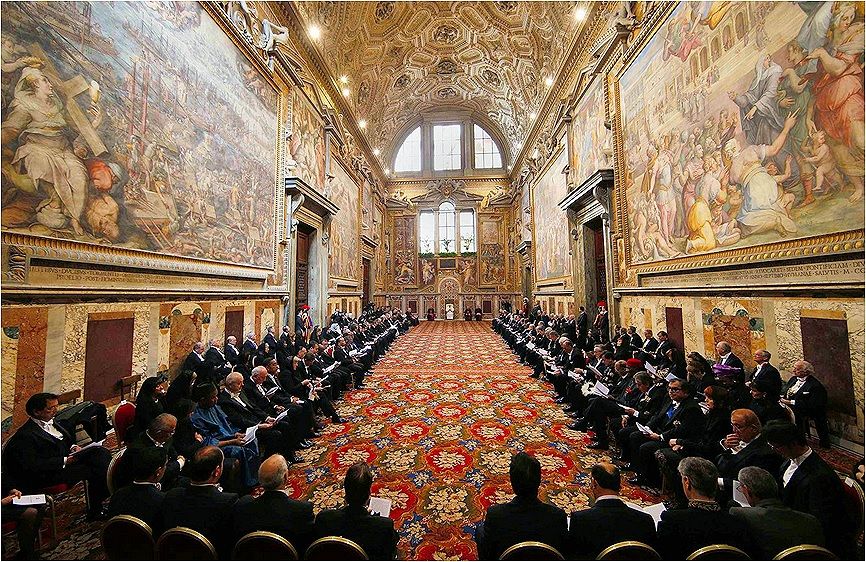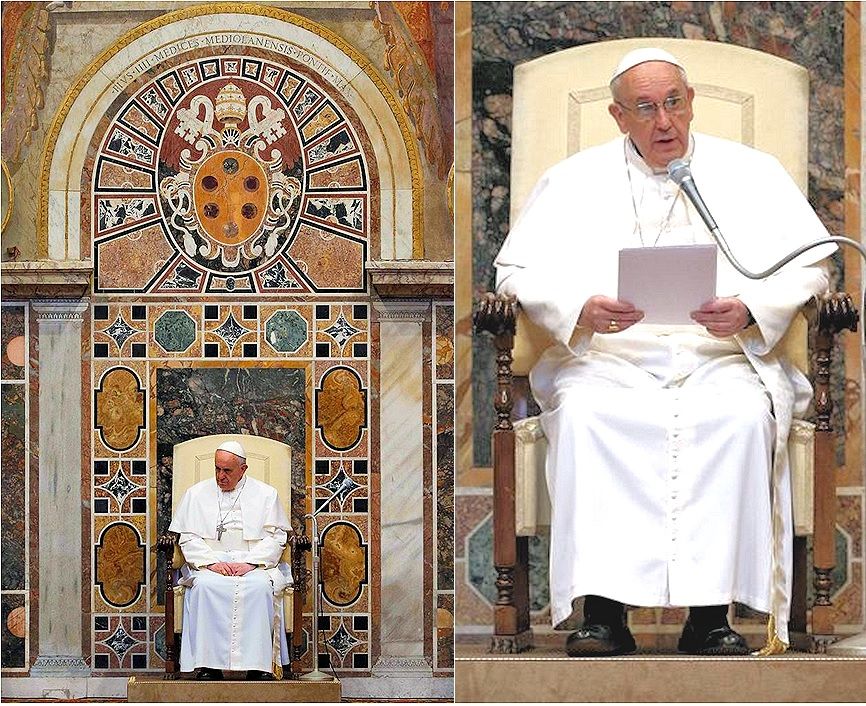 Francis vows to press Benedict's fight
Francis vows to press Benedict's fight
against the 'dictatorship of relativism'

.
Mar. 22, 2013
For those tempted to draw an overly sharp distinction between Pope Francis and his predecessor, the new pope offered a clear reminder Friday that he may have a different style than Benedict XVI, but on substance, he's cut from much the same cloth.
[But he has to be. Did anyone ever doubt that? He's the Pope, and his primary duty is to uphold and defend the deposit of faith handed down from Jesus through the Apostles, and only then can he confirm his brothers in that faith. He can't possibly 'choose' to omit any article of the faith the way he has chosen not to wear red shoes, white pants, or the mozzetta.]

In a speech to the diplomatic corps accredited to the Holy See on Friday, Francis lamented not only the material poverty of the early 21st century but also its "spiritual poverty," meaning a rejection of God and objective standards of morality.
In that regard, Francis quoted Benedict's famous critique of a post-modern "dictatorship of relativism," delivered during a homily for the Mass in 2005 that opened the conclave that elected him pope.
(In its English translation of the pope's remarks, the Vatican actually rendered the term as "tyranny," but the idea is the same. Francis said it "afflicts the so-called richer countries particularly seriously.")
The message seemed clear: Pope Francis will try to live up to his namesake, Francis of Assisi, as a man of the poor and of peace, but that doesn't signal any retreat from the moral and cultural positions associated with the papacies of John Paul II and Benedict XVI.
"There is no peace without truth," Francis told the diplomats. "There cannot be true peace if everyone is his own criterion, if everyone can always claim exclusively his own rights, without at the same time caring for the good of others, of everyone, on the basis of the nature that unites every human being on this earth."
References to universal human nature are often shorthand in Vatican discourse for defense of traditional teaching on matters such as sexuality, marriage and the family.
Francis spoke Friday morning to representatives of 180 nations, leaving just 15 internationally recognized countries that do not have formal diplomatic relations with the Holy See.
Francis said he hoped today "will also be an opportunity to begin a journey" to establishing relations with those remaining nations, which include China, Saudi Arabia and North Korea.
Noting that one of his titles is "pontiff," meaning "bridge builder," Francis pledged to try to create "real spaces of authentic fraternity" among peoples and cultures. He said religions have a special role in that regard: "It is not possible to build bridges between people while forgetting God," he said. But he said the opposite is also true: "It is not possible to establish true links with God while ignoring other people."
In terms of hints of his foreign policy agenda, Francis placed special emphasis on dialogue with Islam, fighting poverty (both material and spiritual), building peace, and protection of the environment.
In his brief remarks, delivered in Italian, Francis did not address any specific global hot spots such as Syria, where the country's embattled Christianity minority is struggling to hold on amid a bloody civil war and rising currents of Islamic radicalism. He also did not come off the cuff, as he has often done during his first week in office, sticking entirely to his prepared text.
Friday's headline, however, is probably less about Francis and foreign policy than about Francis and ecclesial policy.
Based on Friday's speech, at least, anyone who saw his election as a repudiation of the broad philosophical and theological outlook of Benedict XVI probably has another think coming.
One footnote: For the French, it was a bit of a mini-scandal that Francis did not deliver his speech today in French, the language popes traditionally use in diplomatic settings. On background, Vatican officials say the new pope can understand both French and English, but needs time to become accustomed to using those languages in public. Aside from a few lines in Spanish, so far Francis has used Italian almost exclusively for his public remarks.
 Here is the Vatican's official English translation of the Pope's address to the diplomatic corps:
Here is the Vatican's official English translation of the Pope's address to the diplomatic corps:
Your Excellencies,
Ladies and Gentlemen,
Heartfelt thanks to your Dean, Ambassador Jean-Claude Michel, for the kind words that he has addressed to me in the name of everyone present. It gives me joy to welcome you for this exchange of greetings: a simple yet deeply felt ceremony, that somehow seeks to express the Pope’s embrace of the world.
Through you, indeed, I encounter your peoples, and thus in a sense I can reach out to every one of your fellow citizens, with their joys, their troubles, their expectations, their desires.
Your presence here in such numbers is a sign that the relations between your countries and the Holy See are fruitful, that they are truly a source of benefit to mankind. That, indeed, is what matters to the Holy See: the good of every person upon this earth!
And it is with this understanding that the Bishop of Rome embarks upon his ministry, in the knowledge that he can count on the friendship and affection of the countries you represent, and in the certainty that you share this objective.
At the same time, I hope that it will also be an opportunity to begin a journey with those few countries that do not yet have diplomatic relations with the Holy See, some of which were present at the Mass for the beginning of my ministry, or sent messages as a sign of their closeness – for which I am truly grateful.
As you know, there are various reasons why I chose the name of Francis of Assisi, a familiar figure far beyond the borders of Italy and Europe, even among those who do not profess the Catholic faith.
One of the first reasons was Francis’s love for the poor. How many poor people there still are in the world! And what great suffering they have to endure! After the example of Francis of Assisi, the Church in every corner of the globe has always tried to care for and look after those who suffer from want, and I think that in many of your countries you can attest to the generous activity of Christians who dedicate themselves to helping the sick, orphans, the homeless and all the marginalized, thus striving to make society more humane and more just.
But there is another form of poverty! It is the spiritual poverty of our time, which afflicts the so-called richer countries particularly seriously. It is what my much-loved predecessor, Benedict XVI, called the "dictatorship of relativism", which makes everyone his own criterion and endangers the coexistence of peoples.
And that brings me to a second reason for my name. Francis of Assisi tells us we should work to build peace. But there is no true peace without truth! There cannot be true peace if everyone is his own criterion, if everyone can always claim exclusively his own rights, without at the same time caring for the good of others, of everyone, on the basis of the nature that unites every human being on this earth.
One of the titles of the Bishop of Rome is Pontiff, that is, a builder of bridges with God and between people. My wish is that the dialogue between us should help to build bridges connecting all people, in such a way that everyone can see in the other not an enemy, not a rival, but a brother or sister to be welcomed and embraced!
My own origins impel me to work for the building of bridges. As you know, my family is of Italian origin; and so this dialogue between places and cultures a great distance apart matters greatly to me, this dialogue between one end of the world and the other, which today are growing ever closer, more interdependent, more in need of opportunities to meet and to create real spaces of authentic fraternity.
In this work, the role of religion is fundamental. It is not possible to build bridges between people while forgetting God. But the converse is also true: it is not possible to establish true links with God, while ignoring other people.
Hence it is important to intensify dialogue among the various religions, and I am thinking particularly of dialogue with Islam. At the Mass marking the beginning of my ministry, I greatly appreciated the presence of so many civil and religious leaders from the Islamic world.
And it is also important to intensify outreach to non-believers, so that the differences which divide and hurt us may never prevail, but rather the desire to build true links of friendship between all peoples, despite their diversity.
Fighting poverty, both material and spiritual, building peace and constructing bridges: these, as it were, are the reference points for a journey that I want to invite each of the countries here represented to take up.
But it is a difficult journey, if we do not learn to grow in love for this world of ours. Here too, it helps me to think of the name of Francis, who teaches us profound respect for the whole of creation and the protection of our environment, which all too often, instead of using for the good, we exploit greedily, to one another’s detriment.
Dear Ambassadors, Ladies and Gentlemen,
Thank you again for all the work that you do, alongside the Secretariat of State, to build peace and construct bridges of friendship and fraternity.
Through you, I would like to renew to your Governments my thanks for their participation in the celebrations on the occasion of my election, and my heartfelt desire for a fruitful common endeavour. May Almighty God pour out his gifts on each one of you, on your families and on the peoples that you represent. Thank you!
I think we shall not be seeing again the chair of the Pope of Social Justice, Leo XIII, the one surmounted by the Holy Spirit and adorned with those cherubs that resembled Benedict XVI...]
[Modificato da TERESA BENEDETTA 23/03/2013 00:09]